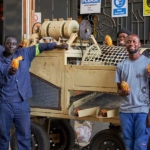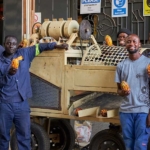
In a country where thousands of young people graduate each year into a job market with limited opportunities, Ghana’s Design and Technology Institute (DTI) is providing a bold and practical solution: Technical and Vocational Education and Training (TVET).
Located in Accra, DTI is redefining education by offering hands-on, industry-relevant training in disciplines such as robotics, welding, and creative arts — skills that align directly with current market demands.
From the Classroom to the Workshop
For students like Frederick Agbedanu and Sanata Zerbo, DTI offers more than just a traditional learning experience. It’s a launchpad into a future built on practical skills, innovation, and entrepreneurship.
“I never imagined I’d be building functional robotic systems,” says Frederick, beaming as he demonstrates one of his class projects. “Here, we don’t just learn theories — we build, we create, and we solve real problems.”
Sanata, one of the few female students in the architecture programme, shared how TVET is empowering her to break barriers in a traditionally male-dominated field.
“I’m learning skills that make me employable and independent. I can start my own business or work anywhere in the world,” she said confidently.
Innovation Meets Opportunity
Behind the scenes, Ebenezer Dadzie, Head of Design and Innovation at DTI, is leading efforts to ensure the institute stays ahead of the curve.
He emphasised the institute’s ongoing investment in modern equipment, tools, and technology to foster a creative environment that supports innovation and entrepreneurship.
“We’ve secured significant funding to expand our facilities and introduce cutting-edge tools. Our students are trained on the same equipment used in global industries,” he said. “This is how we bridge the skills gap — by aligning education with the demands of the workforce.”
Education That Works
Ama Akor, Registrar of DTI, believes that Ghana’s path to reducing youth unemployment lies in embracing TVET as a cornerstone of education reform.
“The narrative around TVET needs to change,” she said. “It’s not a second choice. It’s a smart choice one that leads directly to jobs, self-employment, and real-world success.”
She added that DTI is also working with industry partners to ensure students graduate with both skills and professional connections.
A Model for the Future
With its strong emphasis on practical learning, innovation, and industry collaboration, DTI is positioning itself as a model for how technical education can address one of Ghana’s most pressing challenges youth unemployment.
As more young Ghanaians enroll in TVET programs, the hope is clear: build a generation that is not just educated, but employable, adaptable, and entrepreneurial.
In a job market that rewards skills over certificates, DTI is proving that TVET is not the future it is the present.
- President Commissions 36.5 Million Dollars Hospital In The Tain District
- You Will Not Go Free For Killing An Hard Working MP – Akufo-Addo To MP’s Killer
- I Will Lead You To Victory – Ato Forson Assures NDC Supporters
Visit Our Social Media for More




